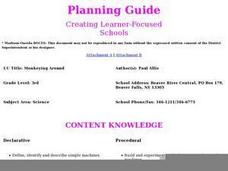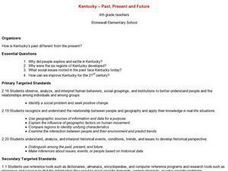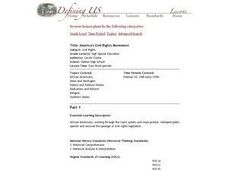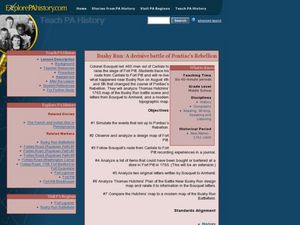Curated OER
Just Say No to Drugs
Students explore the dangers of drugs, drug awareness and abuse and different types of drugs. They demonstrate reading comprehension sills including inference, literal meaning and critical analysis.
Curated OER
Monkeying Around
Third graders study machines. They watch a video about and identify and chart machines they find at home and at school. They design and build simple and compound machines, create an advertisement for them and attempt to sell them at the...
Curated OER
Crossroads of the Continent: Early Trade in Kansas
Learners study early Native American-European trade. They play bartering games to discover trade as an economic funtion, as well as other implications of trading one good for another.
Curated OER
Levers
Fifth graders participate in a review discussion of the parts of a lever, resistance or load, fulcrum, and effort. Next, they complete activities at six experiment stations while collecting data that they share with the class. While...
Curated OER
Kentucky: Past, Present and Future
Fourth graders analyze how Kentucky's past is different from the present. They research why Kentucky was even explored and settles. What social issues face Kentucky now. Discussion lies on how Kentucky can be improved for the 21st century.
Curated OER
America's Civil Rights Movement
Eleventh graders explore, analyze and study the background to America's Civil Rights Movement through the court system, mass protest, public opinion, political cartoons and legislation. They research Rosa Parks, Brown vs. Board of...
Curated OER
Timekeeping by the Sun
Students measure shadows to learn about the Sun-Earth relationship. In this astronomy lesson, students create a shadow stick of a Pokemon character and record measurements of its shadow in a data chart. Follow-up discussions guide...
Curated OER
Bushy Run: A Decisive Battle of Pontiac's Rebellion
Students study the battle at Bushy Run. In this Pontiac's Rebellion lesson, students examine an 1765 map of the Bushy Run battle as well as letters and a modern topographic map of the area in order to simulate the event and research how...
Curated OER
Trouble With Trolls
Students listen to The Trouble With Trolls and discuss fables. In this story elements lesson plan, students work on reading skills. Students participate in different reading activities.
Curated OER
Seals: From the National To the Local
Third graders investigate official government symbols by completing a scavenger hunt. In this U.S. Government activity, 3rd graders participate in a scavenger hunt in which they locate seals or logos in their community....
Curated OER
The Frog and the Ol' Black Fly
Students explore frogs. In this cross curriculum literacy and frogs lesson plan, students predict the plot and then listen to the book The Wide-Mouthed Frog by Keith Faulkner. Students define "predator" and identify foods a frog...
Curated OER
One Room School House Reading Lesson
Students explore schools during the Colonial period. In this American history instructional activity, students participate in a simulation of school days in Colonial America. Students visit a museum and use the schoolhouse as a setting...
Curated OER
Layers of the Earth
Eighth graders study the earth's surface. In this planet structure lesson students view a PowerPoint presentation then draw and label the earths layers.
Curated OER
What Influences Reaction Rate?
Students study reaction rates, what determines how fast a reaction happens and how the chemical changes occur. In this reactions lesson students complete a lab where they use Alka-Seltzer to observe reaction rate and create a graph...
Curated OER
Ping!
Seventh graders study side-scan sonar and discover how it can be used to locate objects underwater. They complete a sonar simulation activity in which they create and map mystery landscapes inside shoeboxes.
Curated OER
Zoom Out
Students explore visual perception and how objects change as distance changes. In this distance and vision lesson, students practice their scientific inquiry skills. Students practice drawing objects from different points of view in...
Curated OER
Design Your Perfect Career
Young scholars incorporate the design process to create their own perfect job or career. In this career design lesson, students develop questions to research for a future career choice. Young scholars brainstorm about their personal...
Curated OER
Literature Comprehension
In this reading comprehension activity, students use the SADDR method to understand the literary tools used in a book. Students complete a speech analysis, action analysis, description analysis, drawing activity, reactions of others...
Curated OER
Listening To a Guest Speaker
Pupils review the main points of note-taking to summarize the content of a formal or informal spoken presentation. They hear a guest speaker talk about a pre-arranged topic and take notes during the presentation. Next, they write a...
Curated OER
Ozone Hole Expert Groups
Research topics associated with the hole in the ozone layer over Antarctica. Researchers write five facts about their topic and one question for each of those facts. They present what they learned to the rest of the class. Six topics are...
Prestwick House
Teaching Shakespeare: Sonnet 73
It's that time of year to consider how Shakespeare selects his images and structures his Sonnet 73 to develop the meaning of the poem. Class members examine the rhyme scheme, the indented lines, the conceit, and the images used in each...
Southern Nevada Regional Professional Development Program
Close Reading in the Classroom
Close reading is key to the analysis and interpretation of literature. A close reading of the title and the epigraph of “The Love Song of J. Alfred Prufrock” offers readers an opportunity to examine how even single words or names can...
EngageNY
Using Sample Data to Compare the Means of Two or More Populations
Determine whether there is a difference between two grades. Teams generate random samples of two grade levels of individuals. Groups use the mean absolute deviation to determine whether there is a meaningful difference between the...
UAF Geophysical Institute
System Interactions: The Lorax and the Truffula Tree
If the Lorax were to write a letter, what would he write? Introduce your class to systems and feedback loops through the whimsical stylings of Dr. Seuss. Learners take on the Lorax's point of view to write a letter, among other activities.
Other popular searches
- Teaching Inference Skills
- Inference Skills First Grade
- Reading Inference Skills
- Powerpoint Inference Skills
- Inference Skills in Reading
- Inference Skills Worksheet
- Science Inference Skills
- Inference Skills Sixth Grade























